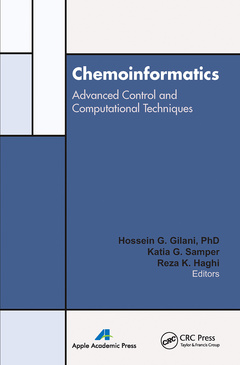Chemoinformatics Advanced Control and Computational Techniques
Coordonnateurs : Gilani Hossein G., Samper Katia G., Haghi Reza Khodaparast

Chemoinformatics: Advanced Control and Computational Techniques provides an important understanding of the main computational techniques used for processing chemical and biological structural data. The theoretical background to a number of techniques is introduced. General data analysis techniques and examination of the application techniques in the industy are presented, along with current practices and current research. The book also provides practical experience of commercially available systems and includes small-scale chemoinformatics-related projects.
The book offers scope for academics, researchers, and engineering professionals. Chapters range from new methods to novel applications of existing methods and help provide an understanding of the material and/or structural behavior of new and advanced systems. It includes innovative chapters on the growth of educational, scientific, and industrial research activities among chemical engineers. It provides the latest coverage of chemical databases and the development of new computational methods and efficient algorithms for chemical software and chemical engineering.
A Thermodynamic Model for Vapor-Liquid Equilibrium Data for the Two Binary Systems. Practical Hints on Measurement of Densities and Excess Molar Volumes. A Mathematical Model to Control the Liquid-Liquid Equilibrium Data. Computer Calculations for Multicomponent Vapor-Liquid and Liquid-Liquid Equilibria. Densities And Refractive Indices of the Binary Systems. Potential Applications of Artificial Neural Networks to Thermodynamics. A Note on Application of Non-Random Two-Liquid (Nrtl) Model. Some Practical Hints on Application of Uniquac Solution Model. Control of Liquid Membrane Separation Process. Development of Artificial Neural Network (Ann) Model for Estimation of Vapor Liquid Equilibrium (Vle) Data. Some Aspects of a Fluid Phase Equilibria and Unifac Model. Molecular Thermodynamics Process Control In Fluid-Phase Equilibria. Estimation of Liquid-Liquid Equilibrium Using Artificial Neural Networks. Optimization of Process Control of Water + Propanoic Acid+ 1-octanol System. Practical Hints on Optimization of Uniquac Interaction Parameters. A Mathematical Approach to Control the Water Content of Sour Gas. Modeling And Control of Thermodynamic Properties by Artificial Neural Networks (ANNs). A Study on Liquid-liquid Equilibria Using Hysys & Uniquac Models. Optimization and Control of Laboratory Production of Ethanol.
Dr. Hossein G. Gilani received his MSc in Chemical Engineering from Bologna University, Italy, in 1982, and his PhD degree in Chemical Engineering from the University of Catalunya, BarcelonaTech (UPC), Spain, in 1992. He is currently an associate professor in the Department of Chemical Engineering. He has served as the Head of Chemical Engineering Department as well as Vice-Dean of Faculty of Engineering in Research.
He is a reviewer for several international journals and a member of the editorial boards of several journals. He has published more than 48 papers in various international research journals and is currently actively engaged in research areas of separation processes using distillation and extraction liquid-liquid, membranes and adsorption, process development, cryogenics, and gas liquefaction processes.
Katia G. Samper is a chemical engineer and is currently in the postgraduate program of chemical systems at the University of Barcelona, Spain.
Reza Khodaparast Haghi is a mechanical engineer and is currently in the postgraduate program of Advanced Control Systems at University of Salford, Manchester, (UK).
Date de parution : 03-2021
15.6x23.4 cm
Date de parution : 07-2012
15.6x23.4 cm
Thème de Chemoinformatics :
Mots-clés :
LLE Data; Mole Fraction; A Mathematical Model to Control the Liquid-Liquid Equilibrium Data; GMDH Model; Practical Hints on Optimization of Uniquac Interaction Parameters; Ternary System; Some Aspects of a Fluid Phase Equilibria and Unifac Model; Organic Rich Phase; Control of Liquid Membrane Separation Process; GMDH Algorithm; Densities And Refractive Indices of the Binary Systems; Calculated Mole Fractions; VLE; ANNs Model; GMDH Type NN; Activity Coefficient; UNIQUAC Model; Excess Molar Volumes; Data Set; Ternary System Water; Fluid Phase Equilibria; Binary Interaction Parameters; Vapor Liquid Equilibrium Data; Acetic Acid; UNIFAC Model; Optimized Transfer Functions; Average RMSD; Stripping Phase; UNIQUAC; Hidden Layer


